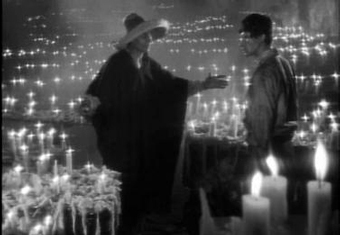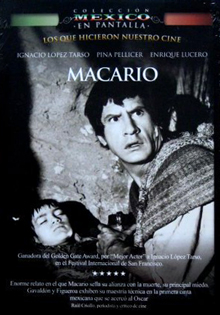
 |
|
|
|
Roberto Gavaldón's Macario isn't well known despite having been nominated for a Best Foreign Language Film Oscar and a Golden Palm at Cannes. It's a macabre fantasy from Mexico, with a very unusual pedigree. It's inspired very little coverage in texts on the Horror Film or Latin American art movies. Yet it remains a powerful picture and a very different kind of film blanc. 2 The 1960 B&W production isn't from an original Mexican folk tale but a short novel by the elusive German author known as B. Traven, who is best known for his book The Treasure of the Sierra Madre. Traven's Macario (published in English as The Third Guest) is a fantastic fairy tale about an impoverished Mexican woodcutter's encounters with figures representing The Devil, God, and Death. The movie version changes the story slightly but retains the book's eerie vision of human existence as a strange interlude of suffering, en route to a mysterious afterlife. Macario (Ignacio López Tarso) is fighting a losing battle with hunger. He hauls firewood to the town for pennies, and never earns enough to feed his family. He starves himself to give his children a little more. Celebrations on The Day of the Dead involve the entire town preparing feasts for the departed, with rituals decorated with skulls and skeleton puppets. But the delirious Macario dreams of the poor skeleton people revolting, murdering their rich counterparts and consuming their food. Seeing the turkeys being prepared for the rich, Macario resolves not to eat again until he can have one all to himself, without sharing. Macario's loving, understanding wife (Pina Pellicer) steals a bird, cooks it and hides it from the children. She sends it with him to eat in the forest, as he wished. Macario is accosted first by The Devil (José Gálvez), a rogue in a gold-studded ranchero outift. The Devil tries to trick Macario into a bite, but Macario turns him away. Similarly, when the white-robed God (José Luis Jiménez) suddenly appears asking for a morsel, Macario begs off, asking to keep the turkey for himself. But then Death (Enrique Lucero) arrives, claiming he's not eaten in thousands of years. Macario does share with the ragged Death, and even makes him laugh. In return, Death gives Macario a fantastic gift -- the limited abiity to cure the sick. Accepting the gift, Macario becomes a wealthy healer, and is able to change his entire life around. But he dares not divulge the secret of his power, even to his frightened wife. She keeps asking to return to their shack on the hill. Sure enough, Macario's success creates jealous enemies, who conspire to do him in. 
Gavaldón's movie packs a complex set of emotions. Macario's hopeless situation is a universal expression of the human condition. His loving family cannot hope to survive, as Macario must kill himself just to try to provide enough for them to eat. The children are only interested in their stomachs and rush to grab their father's portion of the meal; parents are there to give. When Macario's magic revives one of his sons from near death, the kid's first words are, "What's for dinner?" Life seems to be a trap. Nobody looks out for the poor. The rich live behind iron gates and pay a pittance to have Macario's wife wash their laundry. Paupers like Macario must pay for candles and gifts for church rituals; the wife tells her children that their dead can't eat like the dead of the rich, but they must be fed just the same. When Macario balks at buying candles, the candle-maker reminds him that one lives only a short while but spends eternity in the afterlife. Death enters us when we're born, and we carry it around in our livers, our stomachs, our hearts ...which will eventually stop beating. Macario's dealings with the supernatural beings show him to be a man of principle. Macario is too wise to accept the Devil's Gold -- he knows that if he tried to spend gold coins he'd be arrested as a thief. God asks for a bite but Macario says he simply can't afford the gesture, and begs forgiveness. But Macaraio makes fast friends with Death by immediately offering him half the turkey. Macario knows that Death works in the twinking of an eye: if Death instead eats, Macario can at least enjoy a few moments of life to have some turkey for himself. When he becomes a healer Macario must deal with the tangle of human politics. He has been given only a limited amount of precious fluid, a drop of which will cure any ill -- he just has to wait for Death's sign that the sick person isn't on eternity's "must die" list. Partnering with a bourgeois tradesman, Macario becomes rich curing all who ask -- he's soon the subject of a folk song. We note that Macario's partner takes half the money but incurs no risk -- Macario alone takes on the responsibility for his actions. As it happens Macario is never corrupted, as might be the moral if this were an American story. His family is well fed but he doesn't demand high payments from the poor; the townspeople love him. But the doctor and the coffin-maker (interestingly equated as villains) are both put out of work by Macario's success. The doctor denounces Macario to El Santo Oficio -- the Inquisition in the New World. The peasant healer is soon arrested and put to the test: is he a charlatan or a sorcerer? As grim as things get, Macario never loses its sense of humor. Macario has a funny moment of surprise when he discovers that a deathly-looking sick man is indeed curable. A church executioner is asked to help prove Macario a charlatan by pretending to be sick, a deception that leads to a situation worthy of George Bernard Shaw. The cruel torturer is actually a devout man of simple faith -- the threat of a confrontation with a real sorcerer terrifies him. As Macario rushes to its conclusion it takes up (and almost improves upon) a familiar motif. Fleeing from authorities that want to burn him at the stake, Macario finds himself in Death's cave, which is filled with millions of candles, each representing a human life. He wants to take his candle and flee, but Death implores him to stop fighting and embrace his fate ... the afterlife and judgment await, and mercy may be in the offing. The show ends on an ethereal note, aided by Raúl Lavista's music score, as Macario's wife discovers a bizarre irony worthy of Ambrose Bierce. 
The eerie cave of candles is clearly taken from Fritz Lang's amazing silent fantasy Der Müde Tod (Destiny), the classic in which a mother volunteers to exchange her life for that of her child. That European influence along with B. Traven's anonymity probably accounts for the film's low standing in Mexico; we're told that at the time of production Mexican cultural nationalism was at a peak. Traven published in Spanish but was an outsider. I've read more than one critical piece that associates Macario with the kind of Mexican filmmaking deemed manufactured for export. Cinematographer Gabriel Figueroa's beautiful images are sometimes criticized as merely decorative, a charge leveled at pictures like The Pearl, another widely-screened export considered a "safe" product for foreign film festivals. Artists tend to champion unpredictable mavericks like Luis Buñuel, whose shocking Los Olvidados is likely to be blocked from official festival screenings. In the politics of national cinema, Macario doesn't get the credit it deserves as a superior fantasy. We know B. Traven was a film fan because of the strange circumstances around the licensing of the film rights for his The Treasure of the Sierra Madre. The basic story as I understand it is that movie agent Paul Kohner was looking for the rights for director John Huston. Traven agreed to meet with Kohner (through an intermediary) because the author was an enthusiastic fan of Lupita Tovar, the beautiful Mexican actress -- and coincidentally, Kohner's wife. Kohner and Tovar had met years before on the Spanish version of Drácula. Their daughter became a noted actress in her own right -- Susan Kohner. Macario has weight because it encapsules a very Catholic, very Mexican philosophy of life. Existence is a trial and justice is to be found nowhere; one's fate is all but predetermined. True Love doesn't solve Macario's problems, but his goodness and the love of his wife make even a profoundly sad life worth living. Even if it is the creation of a mysterious outsider, the entrancing Macario fully expresses Death's dominant role in Mexican folk culture. Star Ignacio López Tarso contributes a weary intelligence to the character of Macario; he's still working and can probably be best seen in John Huston's 1984 Under the Volcano. Enrique Lucero (Death) shows up more often in films screened here in the United States, and has small parts in Peckinpah's Bring Me the Head of Alfredo Garcia and Major Dundee. The film is also a rare chance to see the wonderful Pina Pellicer, the tiny, bright-faced actress best known as Marlon Brando's young lover in the great western One-Eyed Jacks. Ms. Pellicer's fragile, winning smile becomes even more painfully beautiful when one learns that she committed suicide in 1965, at just thirty years of age. That tragedy adds to the film's mystique -- as a morbid fantasy Macario is as profound as The Seventh Victim. 
I don't have a preferred video version of Macario; the best I've seen is from a company called Coleccion Mexico en Pentalla and is available online at this Amazon link. This copy looks much better than the old laser disc or what has screened infrequently on TCM. It's full frame instead of 1:66 (or wider) and is intact, if a little soft and hazy-looking at times. One scene is marred with some mottling that looks like water damage. Audio is also better than I've ever heard it before. While we're waiting for a better presentation, this will have to do. 1 If you'd care to see Pina Pellicer at work, her fine performance in the somewhat similar Alfred Hitchcock Presents teleplay The Life Work of Juan Diaz (1964) can presently be viewed in its entirety at this link on Hulu. It's slowly paced but has another good performance from Frank Silvera, and a moody Bernard Herrmann music score.
On a scale of Excellent, Good, Fair, and Poor,
Macario rates:
Footnotes:
1. I first caught Macario by accident when our Los Angeles PBS station KCET showed it on a Halloween night as one of several pieces devoted to the Mexican Day of the Dead. I was completely captivated; I remember seeing a poster for it as a child and thought that "Macario" was the name of some horrible monster. I ended up reading the B. Traven short novel while trying to become more fluent in Spanish.
2. Macario lost the Oscar for Best Foreign Language film to Ingmar Bergman's The Virgin Spring. It's interesting that the key supernatural event in both films involves a spring of water magically sprouting from the ground.
Reviews on the Savant main site have additional credits information and are often updated and annotated with reader input and graphics. Also, don't forget the 2009 Savant Wish List. T'was Ever Thus.
Review Staff | About DVD Talk | Newsletter Subscribe | Join DVD Talk Forum |
| ||||||||||||||||||